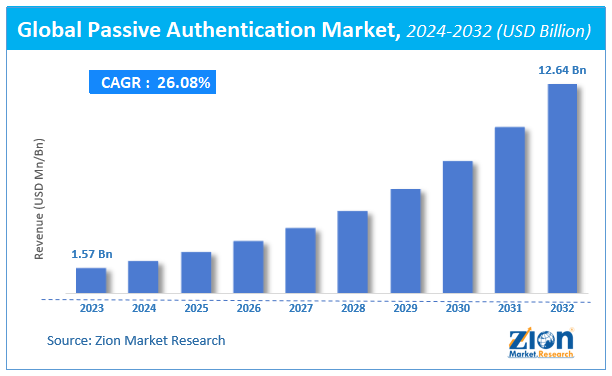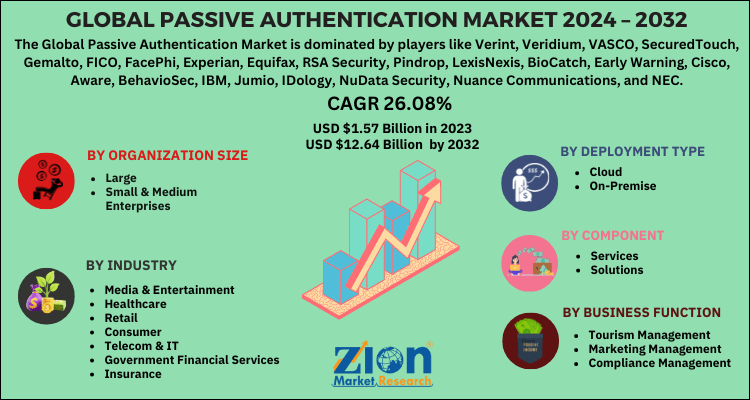Passive Authentication Market Size, Share, Trends, Growth 2032

Passive Authentication Market By Industry (Media & Entertainment, Healthcare, Retail, Consumer, Telecom & IT, Government Financial Services, and Insurance), By Organization Size (Large and Small & Medium Enterprises), By Deployment Type (Cloud and On-Premise), By Business Function (Tourism Management, Marketing Management, Compliance Management, and Others), By Component (Services and Solutions), And By Region - Global And Regional Industry Overview, Market Intelligence, Comprehensive Analysis, Historical Data, And Forecasts 2024 - 2032-
| Market Size in 2023 | Market Forecast in 2032 | CAGR (in %) | Base Year |
|---|---|---|---|
| USD 1.57 Billion | USD 12.64 Billion | 26.08% | 2023 |
Description
Passive Authentication Industry Prospective:
According to the report published by Zion Market Research, the global Passive Authentication Market size was valued at USD 1.57 Billion in 2023 and is predicted to reach USD 12.64 Billion by the end of 2032. The market is expected to grow with a CAGR of 26.08% during the forecast period.
The report analyzes the global Passive Authentication Market's growth drivers, restraints, and impact on demand during the forecast period. It will also help navigate and explore the arising opportunities in the Passive Authentication industry.
Global Passive Authentication Market: Overview
Authentication is the act of verifying the identity of an individual user. Authentication can be passive as well as active. Passive authentication is a process where the identity of an individual user is verified without the need for any specific additional actions for the authentication purpose. Passive authentication needs users to authenticate with the help of a web browser where the user is redirected to an identity provider. The passive authentication process involves the use of behavioral patterns which includes contextual and biometric authentication along with device identification process.
It also includes the multi-factor authentication that offers enhanced control and security to assist organizations discard the requirement for password-based security method.
Global Passive Authentication Market: Growth Factors
One of the major factors driving the growth of the global passive authentication market is the growing replacement for traditional and outdated security ways like password and security questions with the voice biometric which offer a friction-free and most secure method to verify the identity of users in the digital transaction and telephone calls. This process needs a more extended period of speech for establishing a high-security verification method. The passive verification process does not need a user to remember their phone numbers or account numbers. Moreover, the significant spike in the demand for the multi-factor authentication process in an organization will boost the growth of the global passive authentication market during the forecast period.
Also, the growing incidences of cybercrimes all across the globe along with the data security issues are likely to positively shape the trajectory of the global market during the forecast period. The growing demand for secure and quick online transactions is also promoting the growth of the global passive authentication market during the forecast period.
The emergence of the coronavirus pandemic has significantly boosted the growth of the global market. The ongoing trend of the adoption of collaboration tools like Cisco Connect and Zoom is propelling the demand for passive authentication in the market globally due to the ongoing cyber-attacks amid the pandemic. The growing utilization of smartphones for payment services and smart working from one’s own device has induced companies to initiate biometric technology in order to secure the user's devices from hackers. Thus, biometric authentication that includes iris recognition, facial recognition, and fingerprint recognition emerged as a preferable way to secure the identity of the users.
Global Passive Authentication Market: Segmentation
The global passive authentication market can be segmented into the industry, organization size, deployment type, business function, component, and region.
By industry, the market can be segmented into media & entertainment, healthcare, retail, consumer, telecom & IT, government financial services, and insurance.
By organization size, the market can be segmented into large and small & medium enterprises.
By deployment type, the market can be segmented into cloud and on-premise.
By business function, the market can be segmented into tourism management, marketing management, compliance management, and others.
By component, the market can be segmented into services and solutions. The service segment can be further bifurcated into managed and professional services.
Passive Authentication Market: Report Scope
| Report Attributes | Report Details |
|---|---|
| Report Name | Passive Authentication Market |
| Market Size in 2023 | USD 1.57 Billion |
| Market Forecast in 2032 | USD 12.64 Billion |
| Growth Rate | CAGR of 26.08% |
| Number of Pages | 207 |
| Key Companies Covered | Verint, Veridium, VASCO, SecuredTouch, Gemalto, FICO, FacePhi, Experian, Equifax, RSA Security, Pindrop, LexisNexis, BioCatch, Early Warning, Cisco, Aware, BehavioSec, IBM, Jumio, IDology, NuData Security, Nuance Communications, and NEC |
| Segments Covered | By industry, By organization size, By deployment type, By business function, By component and By Region |
| Regions Covered | North America, Europe, Asia Pacific (APAC), Latin America, Middle East, and Africa (MEA) |
| Base Year | 2023 |
| Historical Year | 2018 to 2022 |
| Forecast Year | 2024 - 2032 |
| Customization Scope | Avail customized purchase options to meet your exact research needs. Request For Customization |
Global Passive Authentication Market: Regional analysis
North America accounts for the largest share in the global passive authentication market due to the growing awareness of people regarding passive authentication solutions. Moreover, the high adoption of advanced technology in the region further boosts the growth of the regional market during the forecast period.
Asia Pacific is expected to witness huge growth during the forecast period due to the growing prevalence of cyber-attacks in the region.
Passive Authentication Market: Competitive Analysis
The global passive authentication market is dominated by players like:
- Verint
- Veridium
- VASCO
- SecuredTouch
- Gemalto
- FICO
- FacePhi
- Experian
- Equifax
- RSA Security
- Pindrop
- LexisNexis
- BioCatch
- Early Warning
- Cisco
- Aware
- BehavioSec
- IBM
- Jumio
- IDology
- NuData Security
- Nuance Communications
- NEC
The global passive authentication market is segmented as follows:
By Industry
- Media & Entertainment
- Healthcare
- Retail
- Consumer
- Telecom & IT
- Government Financial Services
- Insurance
By Organization Size
- Large
- Small & Medium Enterprises
By Deployment Type
- Cloud
- On-Premise
By Business Function
- Tourism Management
- Marketing Management
- Compliance Management
- Others
By Component
- Services
- Solutions
Global Passive Authentication Market: Regional Segment Analysis
- North America
- The U.S.
- Canada
- Europe
- France
- The UK
- Spain
- Germany
- Italy
- Rest of Europe
- Asia Pacific
- China
- Japan
- India
- South Korea
- Southeast Asia
- Rest of Asia Pacific
- Latin America
- Brazil
- Mexico
- Rest of Latin America
- Middle East & Africa
- GCC
- South Africa
- Rest of Middle East & Africa
What Reports Provides
- Full in-depth analysis of the parent market
- Important changes in market dynamics
- Segmentation details of the market
- Former, on-going, and projected market analysis in terms of volume and value
- Assessment of niche industry developments
- Market share analysis
- Key strategies of major players
- Emerging segments and regional markets
- Testimonials to companies in order to fortify their foothold in the market.
Table Of Content
FrequentlyAsked Questions
Authentication is the act of verifying the identity of an individual user. Authentication can be passive as well as active. Passive authentication is a process where the identity of an individual user is verified without the need for any specific additional actions for the authentication purpose. Passive authentication needs users to authenticate with the help of a web browser where the user is redirected to an identity provider.
One of the major factors driving the growth of the global passive authentication market is the growing replacement for traditional and outdated security ways like password and security questions with the voice biometric which offer a friction-free and most secure method to verify the identity of users in the digital transaction and telephone calls. This process needs a more extended period of speech for establishing a high-security verification method.
According to the report published by Zion Market Research, the global Passive Authentication Market size was valued at USD 1.57 Billion in 2023 and is predicted to reach USD 12.64 Billion by the end of 2032.
The market is expected to grow with a CAGR of 26.08% during the forecast period.
North America accounts for the largest share in the global passive authentication market due to the growing awareness of people regarding passive authentication solutions. Moreover, the high adoption of advanced technology in the region further boosts the growth of the regional market during the forecast period.
Some of the significant players in the global passive authentication market are Verint, Veridium, VASCO, SecuredTouch, Gemalto, FICO, FacePhi, Experian, Equifax, RSA Security, Pindrop, LexisNexis, BioCatch, Early Warning, Cisco, Aware, BehavioSec, IBM, Jumio, IDology, NuData Security, Nuance Communications, and NEC.
HappyClients
Zion Market Research
Tel: +1 (302) 444-0166
USA/Canada Toll Free No.+1 (855) 465-4651
3rd Floor,
Mrunal Paradise, Opp Maharaja Hotel,
Pimple Gurav, Pune 411061,
Maharashtra, India
Phone No +91 7768 006 007, +91 7768 006 008
US OFFICE NO +1 (302) 444-0166
US/CAN TOLL FREE +1 (855) 465-4651
Email: sales@zionmarketresearch.com
We have secured system to process your transaction.
Our support available to help you 24 hours a day, five days a week.
Monday - Friday: 9AM - 6PM
Saturday - Sunday: Closed







